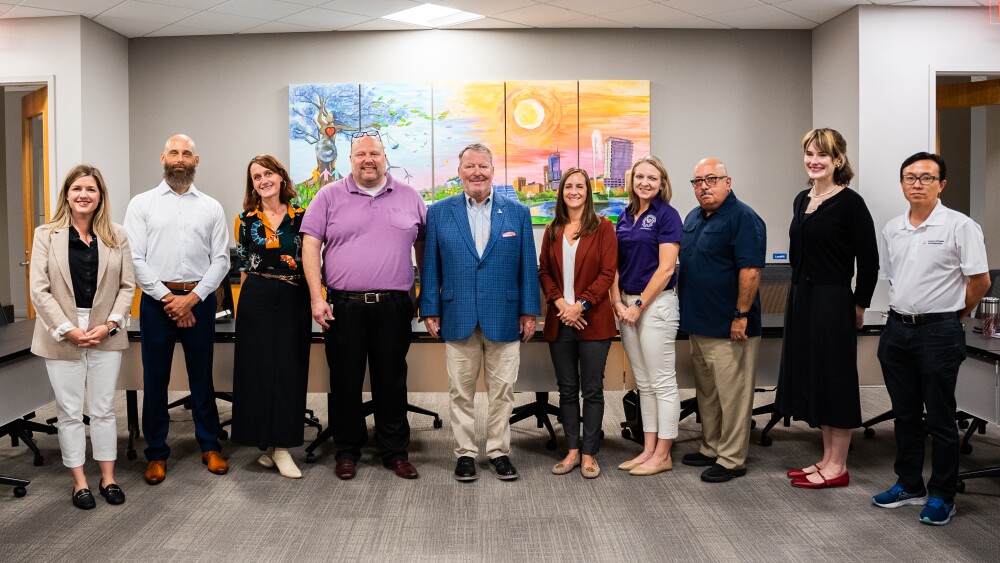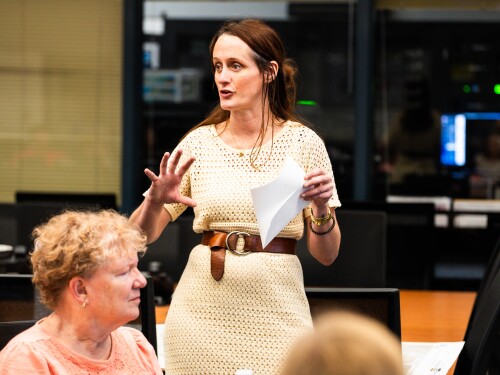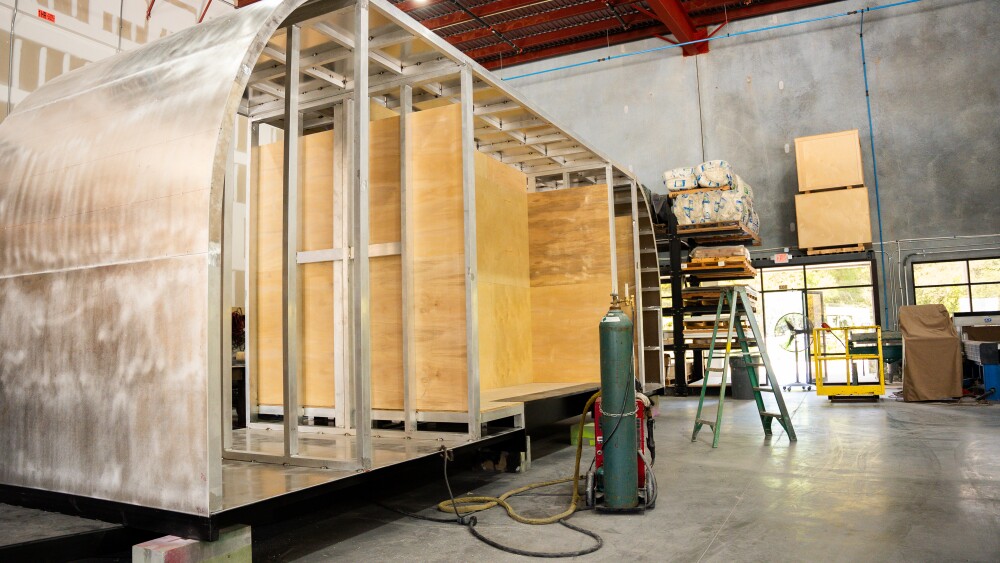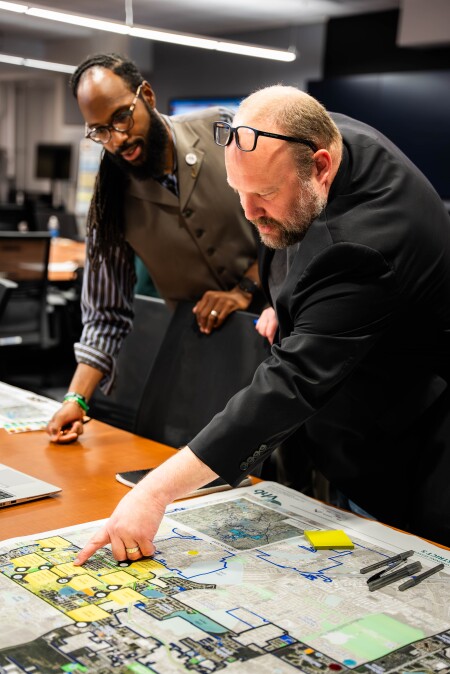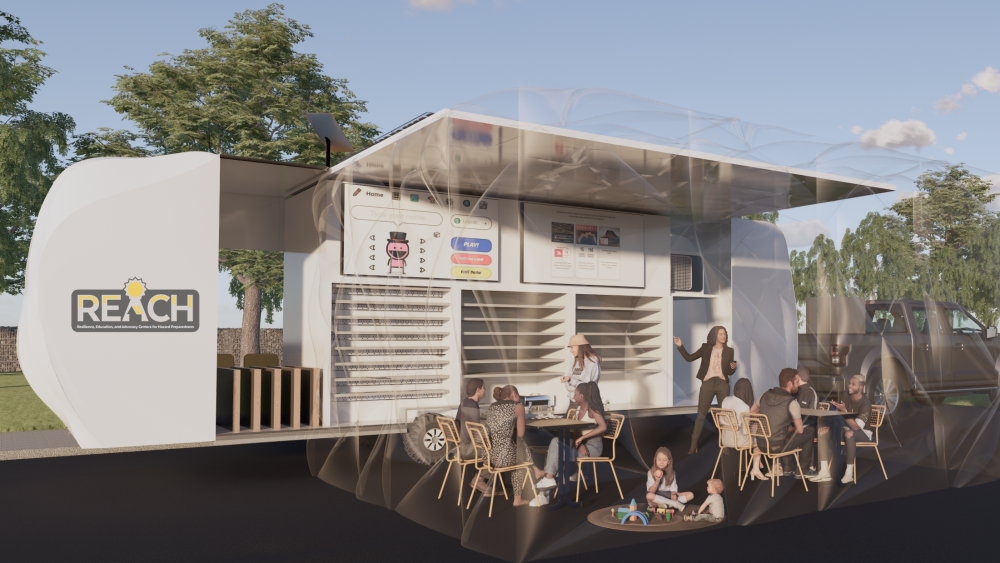
In Central Florida, VHB—a planning, design, engineering, and environmental professional services consulting firm—is partnering with the University of Central Florida (UCF) and the city of Orlando to develop a solar-powered, mobile resiliency hub that can be deployed anywhere in the city with an urgent need.
KMF Architects
Increasingly, such disasters as storms, wildfires, pandemics, and flooding are spurring cities across the United States to prioritize resiliency. Coastal communities throughout Florida know the urgency firsthand. From the Gulf of Mexico to the Atlantic Ocean, many Florida communities were isolated in 2024 when hurricanes and other weather-related events closed roads and cut off power. Our most vulnerable populations took an especially hard hit. Planners, academics, and community members are rethinking how to elevate their response and help communities become more resilient. Could one answer be on four wheels and a chassis?
In Central Florida, VHB—a planning, design, engineering, and environmental professional services consulting firm—is partnering with the University of Central Florida (UCF) and the city of Orlando to develop a solar-powered, mobile resiliency hub that can be deployed anywhere in the city with an urgent need. The Resilience, Education, and Advocacy Center for Hazard preparedness (REACH) Hub will provide essential resources and a safe haven to underserved communities, particularly during extreme weather events and post-disaster scenarios.
The REACH Hub is a component of Orlando’s Resilience Plan, under development with VHB, which identified a need for equitable solutions to assist with power outages and connectivity in Central Florida. The mobile unit reflects the city’s commitment to innovative solutions for a more sustainable future in a quickly transforming world. Here are several foundational elements that influenced the UCF REACH Hub—elements that others can incorporate into their own plans.
Cocreating resiliency initiatives
Urban planners started at the source, with robust community engagement to inform the project and prioritize actions that are equitable and cocreated by the communities the hub will serve. Planners can help stakeholders take a smart community approach that is people-centric and purposeful, that is technology-enabled, and that digs deep into the data to build an equitable hub.
VHB is playing a critical planning role in Orlando by holding community feedback sessions to make certain the REACH Hub will meet the needs of local residents. Our goal was to codesign a hub that is not only functional during disasters but also serves as an educational center and resource for hands-on STEM learning year-round.
Community members provided insightful feedback that is helping VHB design the hub as an intergenerational experience. It could provide such necessities as portable battery chargers, emergency supplies, Wi-Fi access, healthful snacks, water, coffee, and air conditioning. The hub could be set up to meet residents at different venues where its resources are most needed, such as SunRail stations, housing for the homeless, FEMA stations, schools, and city-operated neighborhood centers.
Construction on the vehicle will soon be complete, and launch events are expected in spring 2025.
Leveraging technology
Public services that embrace technology, especially in emergency management, significantly enhance disaster recovery efforts for underserved populations. Communities that often lack reliable access to resources and support mechanisms during crises can benefit immensely. The possibility of AI-powered systems rapidly analyzing and disseminating critical information while prioritizing resiliency is exciting, allowing emergency managers to provide timely notifications and guidance to people in high-risk areas. In the immediate aftermath of a disaster, quick and efficient resource deployment is crucial. The effective use of technology can hasten disaster response times by as much as 50 percent, which is particularly beneficial for vulnerable communities.
The VHB team took a technology-enabled approach that also incorporates sustainability into the UCF REACH Hub. The University of Central Florida is providing academic insight from staff and faculty in energy, climate science, and GIS analysis. Advanced GIS mapping and climate hazard analysis is helping to identify vulnerable communities where the hub can have the greatest impacts. Through solar feasibility studies, optimal locations for capturing solar energy were pinpointed, thus confirming that the mobile unit remains self-sufficient. Integrating renewable energy solutions can reduce urban energy costs by 25 percent and contribute to a more sustainable urban infrastructure.
Setting the stage
Groundwork for the hub was laid early. The city of Orlando has been investing in its neighborhoods to make them more equitable and resilient, and VHB has a longstanding relationship with the city, based on helping to elevate resiliency and sustainability. VHB collaborated on the Parramore Comprehensive Neighborhood Plan, funded by a HUD grant, to elevate healthy community design principles and establish a cradle-to-career educational hub at Creative Village in downtown Orlando. Communities such as Parramore, a historically African American neighborhood that was divided by a highway, are especially vulnerable to climate events and disasters that threaten resiliency.
VHB also partnered with the city on the Future-Ready City Master Plan to develop a guide for embracing new opportunities through a technology-enabled approach that helps address community challenges. This clear vision has resulted in smart-city initiatives such as incorporating a mobile tablet and 5G hotspot checkout program in community centers, as well as a new autonomous shuttle to circulate and connect transit hubs with residents and students in Creative Village.
Funding mechanisms
Partnerships and funding for resiliency hubs can come from various sources, including the U.S. Department of Homeland Security resource for developing such solutions nationwide. UCF and Orlando secured a large National Science Foundation grant to develop the mobile unit, which is currently being built by Model Werks in Apopka, Florida.
Grant funding processes can be highly competitive, especially in an atmosphere of advancing critical infrastructure projects that are competing for limited funding. Early identification of needs and a strong vision for growth and future readiness help position cities for success.
Enhancing post-crisis resilience and equity
Research shows that inclusive community planning can lead to a 23 percent reduction in the disparity of services post-crisis. A thoughtful approach that integrates planning with robust academic research and private partners is helping communities make strides toward equity and inclusiveness. The REACH project’s advisory team members constitute a diverse group that includes the East Central Florida Regional Planning Council and the Orlando Science Center.
Currently, many communities in Florida are preparing and exploring a wide variety of stopgaps and future-ready actions that anticipate regional catastrophes, including a Tampa Bay Post-Disaster Redevelopment Plan for the city of Tampa, Hillsborough County, Pinellas County, and Hernando County.
It’s incumbent upon the diverse members of ULI to be the creative thinkers who help shape a more resilient future. Ultimately, communities will have mobile resiliency hubs ready to go and could reach neighborhoods throughout the United States when needed most.
Curt Ostrodka, AICP, LEED AP, is director of smart communities at VHB and serves as District Council Chair of ULI Central Florida. ULI Central Florida is shaping a sustainable and thriving future for the 14 counties that constitute the Central Florida region.

